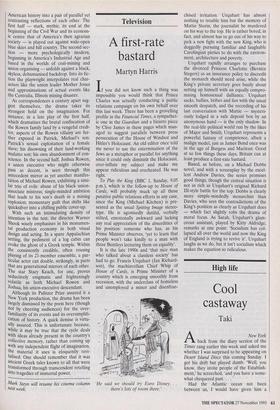Television
A first-rate bastard
Martyrs Harris
If you did not know such a thing was impossible you would think that Prince Charles was actually conducting a public relations campaign on his own behalf over this last week. There has been a grovelling profile in the Financial Times, a sympathet- ic one in the Guardian and a bizarre piece by Clive James in these pages which man- aged to suggest parallels between press persecution of the House of Windsor and Hitler's Holocaust. An old editor once told me never to use the extermination of the Jews as a metaphor or parallel for anything since it could only diminish the Holocaust, over-inflate my subject and make me appear ridiculous and overheated. He was right.
To Play the King (BBC 1, Sunday, 9.05 p.m.), which is the follow-up to House of Cards, will probably muck up all these putative public relations efforts in any case, since the King (Michael Kitchen) is pre- sented as the usual Spitting Image stereo- type. He is agonisedly dutiful, verbally stilted, emotionally awkward and lacking any real appreciation of the absurdities of his position: someone who has, as his Prime Minister observes, 'yet to learn that people won't take kindly to a man with three Bentleys lecturing them on equality'.
It is the late 1990s and 'that nice man who talked about a classless society' has had to go. Francis Urquhart (Ian Richard son), the machiavellian Chief Whip of House of Cards, is Prime Minister of a country which is emerging smoothly from recession, with the underclass of homeless and unemployed a minor and disenfran- `He said we should try Euro Disney.
there's lots of room there.'
chised irritation. Urquhart has almost nothing to trouble him but the memory of Mattie StorM, the journalist he murdered on his way to the top. He is rather bored, in fact, and almost has to go out of his way to pick a new fight with the new King, who is doggedly pursuing familiar and laughable Carolingian pieties to do with the environ- ment, architecture and poverty.
Urquhart rapidly arranges to purchase the divorced Princess Charlotte (Bernice Stegers) as an insurance policy to discredit the monarch should need arise, while the King's private secretary goes busily about setting up himself with an equally compro- mising homosexual dalliance. Urquhart sacks, bullies, bribes and lies with the usual smooth despatch, and the recording of his last conversation with Mattie — mysteri- ously lodged in a safe deposit box by an anonymous hand — is the only shadow. In the real-life political world run by the likes of Major and Smith, Urquhart represents a powerful fantasy of competence, albeit a malign model, just as James Bond once was in the age of Burgess and Maclean. Good at so few things these days, Britain can at least produce a first-rate bastard.
Based, as before, on a Michael Dobbs novel, and with a screenplay by the excel- lent Andrew Davies, the series promises good things, though the central situation is not as rich as Urquhart's original Richard HI-style battle for the top. Dobbs is clearly more simple-mindedly monarchist than Davies, who sees the contradictions of the King's position as clearly as Urquhart does — which fact slightly robs the drama of moral focus. As Sarah, Urquhart's glam- orous assistant, played by Kitty Aldridge, remarks at one point: 'Socialism has col- lapsed all over the world and now the King of England is trying to revive it'. Urquhart laughs as we do, but it isn't socialism which makes the equation so ridiculous.










































































 Previous page
Previous page